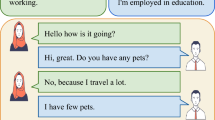Abstract
In language emergence, neural agents engage in finite-length conversations using a finite set of symbols to reach a given goal. In such systems, two key factors can determine the dialogue structure; the size of the symbol set and the conversation length. During training, agents invent and assign meanings to the symbols without any external supervision. Existing studies do not investigate how these models behave when they train under multiple tasks requiring different levels of coordination and information exchange. Moreover, only a handful of work discusses the relationship between the dialogue structure and the performance. In this paper, we formulate a game environment where neural agents simultaneously learn on heterogeneous tasks. Using our setup, we investigate how the dialogue structure and the agent’s capability of processing memory affect the agent performance across multiple tasks. We observed that memory capacity non-linearly affects the task performances, where the nature of the task influences this non-linearity. In contrast, the performance gain obtained by varying the dialogue structure is mostly task-independent. We further observed that agents prefer smaller symbol sets with longer conversation lengths than the converse.
Supported by CODEGEN QBITS Lab.
Access this chapter
Tax calculation will be finalised at checkout
Purchases are for personal use only
Similar content being viewed by others
References
Austin, J.: How to Do Things with Words Harvard University Press. Cambridge, MA (1962)
Bouchacourt, D., Baroni, M.: How agents see things: on visual representations in an emergent language game. arXiv preprint arXiv:1808.10696 (2018)
Chaabouni, R., Kharitonov, E., Bouchacourt, D., Dupoux, E., Baroni, M.: Compositionality and generalization in emergent languages. arXiv preprint arXiv:2004.09124 (2020)
Chaabouni, R., Kharitonov, E., Dupoux, E., Baroni, M.: Anti-efficient encoding in emergent communication. arXiv preprint arXiv:1905.12561 (2019)
Evtimova, K., Drozdov, A., Kiela, D., Cho, K.: Emergent communication in a multi-modal, multi-step referential game. arXiv preprint arXiv:1705.10369 (2017)
Foerster, J.N., Assael, Y.M., de Freitas, N., Whiteson, S.: Learning to communicate to solve riddles with deep distributed recurrent q-networks. arXiv preprint arXiv:1602.02672 (2016)
Gupta, A., Resnick, C., Foerster, J., Dai, A., Cho, K.: Compositionality and capacity in emergent languages. In: Proceedings of the 5th Workshop on Representation Learning for NLP, pp. 34–38 (2020)
Havrylov, S., Titov, I.: Emergence of language with multi-agent games: learning to communicate with sequences of symbols. In: Advances in Neural Information Processing Systems, pp. 2149–2159 (2017)
Hochreiter, S., Schmidhuber, J.: Long short-term memory. Neural Comput. 9(8), 1735–1780 (1997)
Jang, E., Gu, S., Poole, B.: Categorical reparameterization with Gumbel-Softmax. arXiv preprint arXiv:1611.01144 (2016)
Johnson, J., Hariharan, B., van der Maaten, L., Fei-Fei, L., Lawrence Zitnick, C., Girshick, R.: CLEVR: a diagnostic dataset for compositional language and elementary visual reasoning. In: Proceedings of the IEEE Conference on Computer Vision and Pattern Recognition, pp. 2901–2910 (2017)
Jorge, E., Kågebäck, M., Johansson, F.D., Gustavsson, E.: Learning to play guess who? And inventing a grounded language as a consequence. arXiv preprint arXiv:1611.03218 (2016)
Kharitonov, E., Chaabouni, R., Bouchacourt, D., Baroni, M.: Entropy minimization in emergent languages. In: International Conference on Machine Learning, pp. 5220–5230. PMLR (2020)
Lazaridou, A., Hermann, K.M., Tuyls, K., Clark, S.: Emergence of linguistic communication from referential games with symbolic and pixel input. arXiv preprint arXiv:1804.03984 (2018)
Lazaridou, A., Peysakhovich, A., Baroni, M.: Multi-agent cooperation and the emergence of (natural) language. arXiv preprint arXiv:1612.07182 (2016)
Mordatch, I., Abbeel, P.: Emergence of grounded compositional language in multi-agent populations. In: Thirty-Second AAAI Conference on Artificial Intelligence (2018)
Resnick, C., Gupta, A., Foerster, J., Dai, A.M., Cho, K.: Capacity, bandwidth, and compositionality in emergent language learning. arXiv preprint arXiv:1910.11424 (2019)
Rumelhart, D.E., Hinton, G.E., Williams, R.J.: Learning representations by back-propagating errors. Nature 323(6088), 533 (1986)
Sukhbaatar, S., Fergus, R., et al.: Learning multiagent communication with backpropagation. In: Advances in Neural Information Processing Systems, pp. 2244–2252 (2016)
Acknowledgements
We thank Dr. Ranga Rodrigo and Dr. Jayathu Samarawickrama for arranging insightful discussions.
Author information
Authors and Affiliations
Editor information
Editors and Affiliations
Rights and permissions
Copyright information
© 2021 Springer Nature Switzerland AG
About this paper
Cite this paper
Vithanage, K., Wijesinghe, R., Xavier, A., Tissera, D., Jayasena, S., Fernando, S. (2021). Effect of Dialogue Structure and Memory on Language Emergence in a Multi-task Game. In: Wojtkiewicz, K., Treur, J., Pimenidis, E., Maleszka, M. (eds) Advances in Computational Collective Intelligence. ICCCI 2021. Communications in Computer and Information Science, vol 1463. Springer, Cham. https://doi.org/10.1007/978-3-030-88113-9_17
Download citation
DOI: https://doi.org/10.1007/978-3-030-88113-9_17
Published:
Publisher Name: Springer, Cham
Print ISBN: 978-3-030-88112-2
Online ISBN: 978-3-030-88113-9
eBook Packages: Computer ScienceComputer Science (R0)




